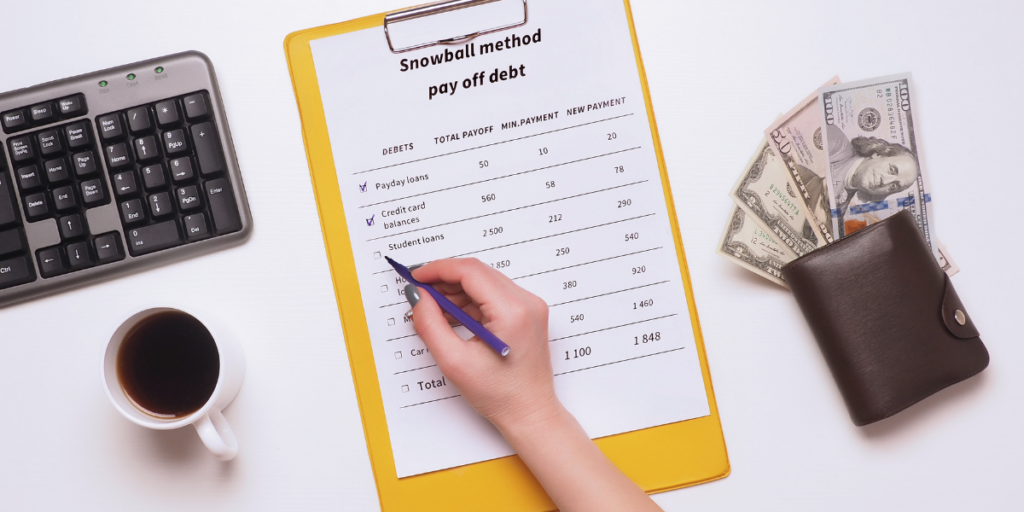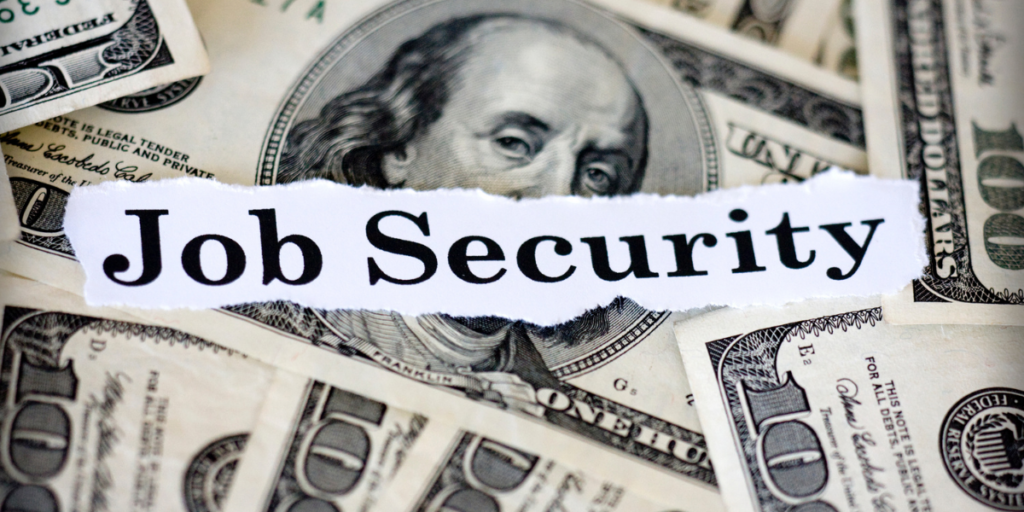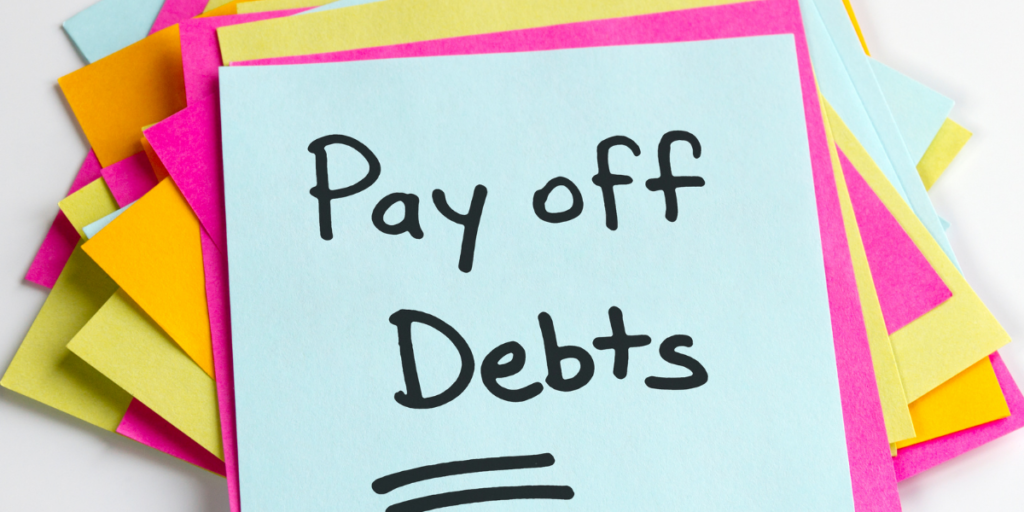Managing your finances can be challenging. In our path towards financial freedom, or whatever goal we might have, there are likely to be many questions along the way.
One of those questions comes up often in the personal finance community, should you invest your money or pay off debt? And to be honest, there isn’t a one-size-fits-all approach. Because everyone’s financial and life situations vary, the answer could vary as well.
In this post, I want to help you decide what the best route is for your money and some ways you can consider investing it. Let’s get started.

Take Stock of Your Finances
The first step in understanding what the best route is for your money is to take stock of your income, debts, and general finances.
You’ll want to analyze your current income as well as any outstanding debts you might have.
Income
Write down any and all income that you have. This could include income from side hustles, business income, or other investment income.
Debts
Write down all debts that you have including the outstanding balance, interest rate, and minimum payments for each account. This will be used to analyze when it makes sense to pay them off, or when it might be a better option to grow your money.

Other Considerations
There are some other external factors that you’ll want to consider before making a decision about your money. This can include anything from your job security or a large windfall that came your way recently.
Here are some things you’ll want to keep in mind:

- Life expectancies like a newborn child
- Medical costs
- Job and income outlook
- Do you have an emergency fund established
So When Does it Make Sense to Pay Off Debt?
Now that you’ve laid out your finances and identified all of your debts, let’s take a look at when it makes sense to pay off these debts.

Is your debt high-interest?
High-interest debts can cause lifelong struggles for your finances and these should become a priority.
What’s considered high-interest debt?
For most, this will include any debts that incur an interest rate higher than ~5%.

Some common culprits of high-interest debts include credit card debt, student loans, personal loans, and payday loans.
If you have large amounts of high-interest debts, paying off the debt with the highest interest rate should be your number one priority with your money. Once this debt is paid off, you’ll want to move on to the next highest interest rate debt until all of your high-interest debts are paid off.
Keep in mind that you’ll still need to make all minimum payments on other debts while paying off these high-interest debts. This will help you to avoid any late payment fees.

What is your mindset about debt?
Some people may become anxious with any debt at all. For these people, it might make sense to pay off your debts to aid your mental health.
Do you have low job security?
Some people will have stronger job security than others. For example, those who work in healthcare often have strong job security or have an easier time finding a new position in the case of a layoff. However, for others, your job might be more at risk and it could be more difficult to obtain a new position.
For these people with less job security, paying off debt is likely a better option for your finances in the case of a job loss or decrease of income.

Are your finances running thin?
If your debt-to-income ratio is high or you have trouble paying your normal expenses on time, paying off debt should be a priority before investing.
This can also help to alleviate any financial anxiety in the case of poor investment performance.
When Does it Make Sense to Invest?
Sometimes, you might better off paying off debts slowly and instead investing your money.

Is Your Debt Low-Interest?
Low-interest debts can be the best type of debt to have. In some cases, it can actually work in your favor.
I would define low-interest debts as any debt with an interest rate of less than ~3%.
Low-interest debts can include a mortgage and some auto loans.

It’s important to note that these debts are still considered debts and you’ll still want to pay them off when due.
Do you have a long time to invest?
Those with a long time to grow their money have a higher chance of producing positive returns as well as benefit from tax advantages when the time comes to sell your investments.
If you have low-interest debts and more than 2-3 years to grow your money, investing might be a better option than paying off debt.
Do you have an emergency fund established?
Another aspect to consider before investing is ensuring your finances are in a good place. This includes having an emergency fund set up. Your emergency fund should cover around 6 months of your normal expenses so that in the case of a job loss, you can still cover your normal bills.

Additionally, an emergency fund can help to cover any unexpected cost like a trip to the emergency room or a major car repair.
Why Invest Instead of Paying Off Debt?
The theory behind investing your money instead of paying off debt is relatively easy to understand. If your debt carries an interest rate of 2.5% annually and you believe your investments can achieve a return of 7% annually, the amount you would profit from your investments would exceed the interest accrued from your debts. At the end of the year, you could pay off your debts and interest with money left over.
What Investments Might Be Right For You?
Everyone has varying levels of knowledge and skill when it comes to investing and making the best decision for growing their money. My goal is to help you break down what your options are and some things you may want to consider before making investments. I’ve broken them down into several categories: for everyone, for some, and for no-one.

For Everyone: Index Funds, ETFs, and Mutual Funds
When you think of investing, many people will inherently think of Wall Street and the stock market.
Why?
Investing in these assets has been historically reliable for those looking to grow their money.
While there is no definitive investment, you can expect a typical index fund to grow between 6 and 10% annually.

Choosing which index fund or ETF to invest in might seem like a daunting task, however, I would recommend doing some research before making your investments. Some of my favorite index funds include VOO, SPY, and VTV.
For Everyone: Invest in Passive Income Streams
Passive income, or the ability to make money with limited work required, is an excellent way to increase your overall income and keep your income diversified.
Some of my favorite passive income streams include: investing in dividend-paying stocks, renting out equipment, starting a blog, or writing a book.

Passive income does come with one catch, however. Typically it will take a large investment up front to starting building a significant income. This can come in the form of time or money. For example, if you plan on writing a book, this will take a large amount of time before seeing a single dollar of income. Once the book has been published and you start to gain sales, the ongoing work is kept to a minimum.
For Some: Start a Business
Starting a business of any kind requires a few characteristics: passion, dedication, and some knowledge. That’s not to say you cannot start a successful business without these, however, it will make the journey somewhat easier.
Whether you choose to make money selling candles from home or use a 3D printer to make money, there are thousands of businesses you can start without much knowledge required.

Starting a business can be considered extremely risky, and that’s certainly true in many cases. But by starting a business with a proven business model and you are passionate about, you can easily be capable of growing your business with the possibility of replacing your primary income stream.
For Some: Invest in Real Estate
There are several ways you can choose to invest in real estate, some of them more difficult than others. For example, investing in rental properties will require a larger investment with more hands-on experience while choosing to invest in a real estate investment trust (REIT) can be treated more like an index fund requiring virtually no work.

For Some: Invest in Stocks
Picking individual stocks or constructing your own portfolio can be quite challenging. For that reason, I wouldn’t recommend it to everyone, but there are a few who might be capable of producing strong returns by investing in companies they deem undervalued.
Many of these investors will have a background in financial analysis and are capable of identifying key indicators that can predict over or underperform for a company in the future.
For No-One: Day Trading
Day trading can be extremely risky for even the most seasoned investors. While there are a few who have managed to make a living off of day trading, for 99% of people, this can be a quick way to lose money fast.

By purchasing individual stocks or assets with the hopes of small gains within the day, you’ll be susceptible to short-term volatility which can lead to massive losses. It’s also worth noting that any potential gains you could make would be taxed at short term capital gains rate, much higher than long-term capital gains rates.
Investing the Smart Way
Now that you’ve seen some of your investment options, there’s one investment that beats all of them: diversification. By spreading out your investments over several asset classes, you can limit losses in specific areas. Whether you plan on investing to make money daily, or you’re looking for long-term results, diversification is vital.
If the majority of your investments are made in one asset class like the stock market, if this performs poorly, your entire investment portfolio will drop. By spreading your investments, if one asset underperforms and another over performs, you could see potential gains or limit losses to a minimum.

There is no exact method to diversification, so it’s wise to consult a financial advisor to get more direction to structure your investment portfolio to maximize your earning potential.
Conclusion
There is no one right answer when it comes to deciding what to do with your money and you should always consult your financial advisor before making any decisions regarding your money. In almost every case, paying off high-interest should be a priority before you start investing.

Those with low-interest debts might consider investing money before paying off debts as the expected rate of return can often be greater than the interest rate on your debt. This means you’ll have a net gain by choosing to invest.
But there isn’t one investment that you should use. By keeping your portfolio diversified between different asset classes you can minimize the effects of short-term volatility and set a solid foundation for long-term growth.
Have you considered investing before paying off a low-interest loan? Why or why not? Comment below!

Bio: Forrest is the owner of Don’t Work Another Day, a personal finance, investing, and entrepreneurship blog dedicated to helping others live a life on their own terms.